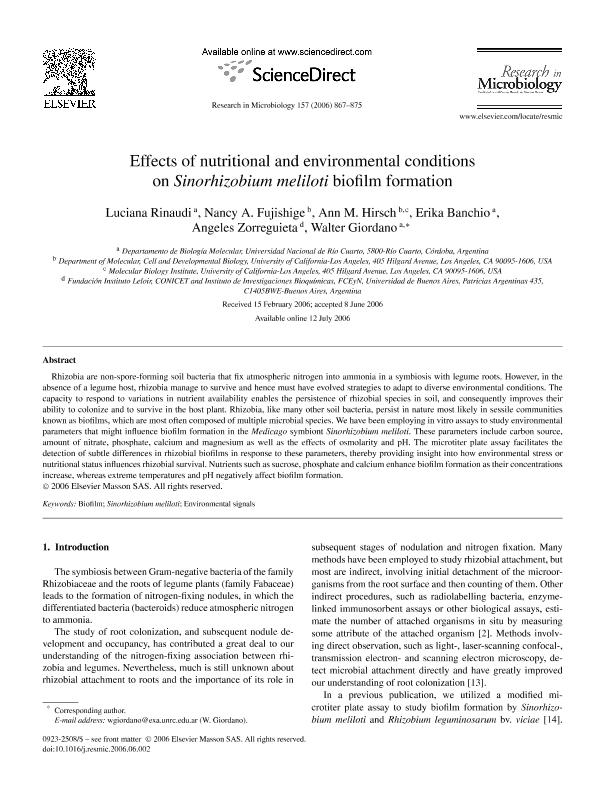Artículo
Effects of nutritional and environmental conditions on Sinorhizobium meliloti biofilm formation
Rinaudi, Luciana Veronica ; Fujishige, Nancy A.; Hirsch, Ann M.; Banchio, Erika
; Fujishige, Nancy A.; Hirsch, Ann M.; Banchio, Erika ; Zorreguieta, Ángeles
; Zorreguieta, Ángeles ; Giordano, Walter Fabian
; Giordano, Walter Fabian
 ; Fujishige, Nancy A.; Hirsch, Ann M.; Banchio, Erika
; Fujishige, Nancy A.; Hirsch, Ann M.; Banchio, Erika ; Zorreguieta, Ángeles
; Zorreguieta, Ángeles ; Giordano, Walter Fabian
; Giordano, Walter Fabian
Fecha de publicación:
11/2006
Editorial:
Elsevier Science
Revista:
Research In Microbiology
ISSN:
0923-2508
e-ISSN:
1769-7123
Idioma:
Inglés
Tipo de recurso:
Artículo publicado
Clasificación temática:
Resumen
Rhizobia are non-spore-forming soil bacteria that fix atmospheric nitrogen into ammonia in a symbiosis with legume roots. However, in the absence of a legume host, rhizobia manage to survive and hence must have evolved strategies to adapt to diverse environmental conditions. The capacity to respond to variations in nutrient availability enables the persistence of rhizobial species in soil, and consequently improves their ability to colonize and to survive in the host plant. Rhizobia, like many other soil bacteria, persist in nature most likely in sessile communities known as biofilms, which are most often composed of multiple microbial species. We have been employing in vitro assays to study environmental parameters that might influence biofilm formation in the Medicago symbiont Sinorhizobium meliloti. These parameters include carbon source, amount of nitrate, phosphate, calcium and magnesium as well as the effects of osmolarity and pH. The microtiter plate assay facilitates the detection of subtle differences in rhizobial biofilms in response to these parameters, thereby providing insight into how environmental stress or nutritional status influences rhizobial survival. Nutrients such as sucrose, phosphate and calcium enhance biofilm formation as their concentrations increase, whereas extreme temperatures and pH negatively affect biofilm formation.
Palabras clave:
Biofilm
,
Environmental Signals
,
Sinorhizobium Meliloti
Archivos asociados
Licencia
Identificadores
Colecciones
Articulos(CCT - CORDOBA)
Articulos de CTRO.CIENTIFICO TECNOL.CONICET - CORDOBA
Articulos de CTRO.CIENTIFICO TECNOL.CONICET - CORDOBA
Articulos(IIBBA)
Articulos de INST.DE INVEST.BIOQUIMICAS DE BS.AS(I)
Articulos de INST.DE INVEST.BIOQUIMICAS DE BS.AS(I)
Citación
Rinaudi, Luciana Veronica; Fujishige, Nancy A.; Hirsch, Ann M.; Banchio, Erika; Zorreguieta, Ángeles; et al.; Effects of nutritional and environmental conditions on Sinorhizobium meliloti biofilm formation; Elsevier Science; Research In Microbiology; 157; 9; 11-2006; 867-875
Compartir
Altmétricas



